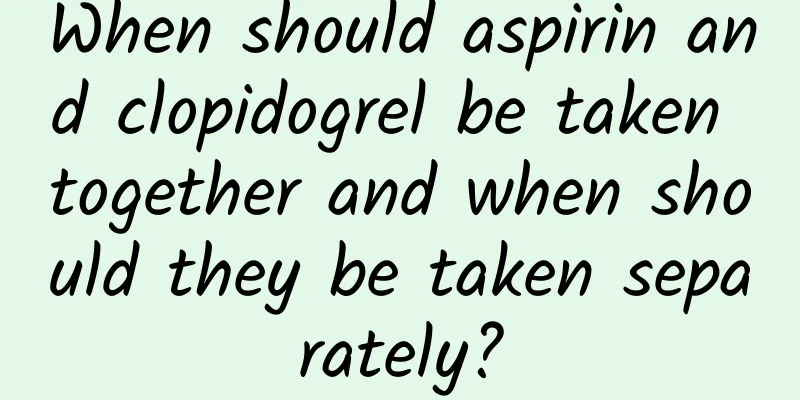When should aspirin and clopidogrel be taken together and when should they be taken separately?

|
A friend told Huazi that his father had been taking aspirin since he was diagnosed with coronary heart disease, but he still had a myocardial infarction some time ago. After a heart stent was placed, the doctor added clopidogrel to aspirin. He was very confused, why did he still have a myocardial infarction after taking aspirin, and how long should he take the two antiplatelet drugs? Huazi said that some people are resistant to aspirin , and for people at high risk of cardiovascular and cerebrovascular diseases, taking aspirin alone may not achieve the ideal preventive effect. 1. Antiplatelet therapy may lead to drug resistance Aspirin can inhibit cyclooxygenase on platelets and inhibit platelet aggregation to form thrombi. It is the most commonly used antiplatelet drug. However, people have found that some people develop drug resistance after taking aspirin, and still suffer from cardiovascular and cerebrovascular diseases such as myocardial infarction and cerebral infarction. According to relevant statistics, the probability of drug resistance when taking aspirin alone is about 30% . The metabolites of clopidogrel can inhibit the platelet P2Y12 receptor, which is another commonly used antiplatelet drug. The probability of drug resistance when taking clopidogrel alone is about 40% . However, when the two drugs are used in combination, they inhibit platelets through different pathways, and the probability of drug resistance will be reduced to 5%. Therefore, for those at high risk of cardiovascular and cerebrovascular diseases, doctors will use two antiplatelet drugs for "dual anti" treatment. 2. “Dual Antibody” should be used only when the benefits outweigh the risks Although the probability of drug resistance in "dual-antibody" treatment is lower and the prevention effect of thrombosis is better, it is not suitable as a routine prevention plan because aspirin can directly damage the gastric mucosa and inhibit the production of prostaglandins; clopidogrel can inhibit the release of platelet-derived growth factor and weaken the repair and protection of the gastrointestinal mucosa. Therefore, "dual-antibody" treatment is a double-edged sword. While preventing thrombosis, it will inevitably cause damage to the gastrointestinal mucosa and increase the risk of bleeding. It is only recommended when the benefits clearly outweigh the risks. "Dual anti-cancer" treatment is usually only used for patients at high risk of cardiovascular diseases such as acute coronary syndrome, interventional balloon angioplasty, heart stents, and heart bypass surgery. The duration of "dual anti-cancer" treatment is confirmed by the doctor depending on the specific situation, ranging from 1 to 18 months. For example, treatment is usually required for 1 to 3 months after balloon angioplasty, and treatment is usually required for 6 to 12 months after stent surgery. 3. Which drug should be kept at the end of dual-antibody treatment? Although dual-antibody therapy can achieve the strongest antiplatelet effect, the risk of medication will also increase. After the course of treatment, single-drug therapy should be resumed. In terms of drug retention, the traditional view is that aspirin is more effective in preventing thrombosis , but aspirin also causes greater damage to the digestive tract. Therefore, for those who do not have digestive tract diseases or injuries, it is recommended to stop taking clopidogrel and keep aspirin. However, if you have digestive tract diseases or digestive tract damage, you can keep clopidogrel and stop taking aspirin. At the same time, add antacids (such as prazole drugs, tidine drugs, etc.) and gastric mucosal protective agents to protect the gastric mucosa. 4. What should I pay attention to during “dual-antibody” treatment? Choose enteric-coated aspirin tablets and take them on an empty stomach at least half an hour before meals or before bedtime. It is recommended to take clopidogrel within 15 minutes after meals to reduce adverse reactions and increase the effectiveness of the drug. During the medication period, it is important to control blood pressure. Blood pressure should not exceed 160mmHg . It is best to control blood pressure below 130/80mmHg to reduce the risk of cerebral hemorrhage. If you have Helicobacter pylori infection, it is recommended to cure it before starting treatment to reduce damage to the gastric mucosa. During medication, be careful to avoid combining it with other drugs that damage the digestive tract, and do not eat irritating foods. "Dual-antibody" treatment is not recommended for people over 80 years old. To sum up, aspirin and clopidogrel are both antiplatelet drugs, and drug resistance may occur when used alone. People at high risk of cardiovascular disease need "dual-antibody" treatment to effectively prevent the formation of blood clots. However, the risk of "dual-antibody" treatment is high, and it is not recommended as a long-term preventive medication plan. The drug must be used under the guidance of a doctor. If you have any questions about the medication, please consult a doctor or pharmacist. I am pharmacist Huazi, welcome to follow me and share more health knowledge. |
>>: Why is 40 a threshold for presbyopia?
Recommend
How long does it take for a pregnant woman to eat old hens?
The bodies of most pregnant women are relatively ...
Do you know what are the functions and effects of lotus root?
Many people in our lives like to eat lotus root. ...
Will uterine coldness lead to infertility?
It can be said that the problem of infertility du...
What causes urinary incontinence in women?
Many modern women like to judge their physical he...
The impact of posterior cervix on normal delivery
Even though caesarean sections are becoming more ...
What is the method of interferon treatment for cervical erosion?
Nowadays, many young girls suffer from cervical e...
What should women eat if they have poor immunity?
When female friends have poor immunity, it is eas...
Sexual quotient is the real wealth of a woman's life
Women have three intelligences, namely IQ, EQ and...
Is watermelon cold or hot? Why does eating watermelon cause diarrhea?
Summer is the main season for eating watermelon, b...
Fubi Shuyangdao Effervescent Tablets
When vaginitis occurs, female friends usually fee...
What are the symptoms of estrus in women
Symptoms of estrus in women usually include an ac...
Endometrium after medical abortion 03cm
After the medicine is injected, the endometrium r...
What to do if you have accessory breasts after childbirth?
Postpartum accessory breasts refer to the conditi...
Is it cumin or fennel that is put in barbecue? What are the taboos of eating barbecue together?
Eating too much barbecue is very likely to cause ...
[Medical Q&A] What are the common misunderstandings about home medication?
Planner: Chinese Medical Association Reviewer: He...









